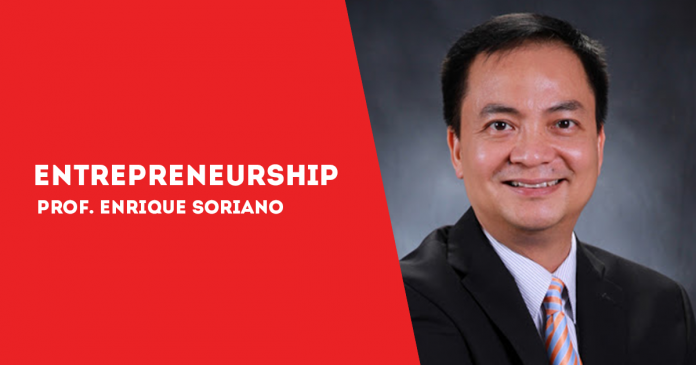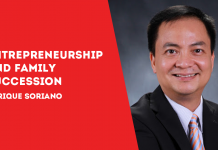
BY PROF. ENRIQUE SORIANO
FOUNDERS and visionaries constantly worry that their companies will fall apart without them.
According to Rick James, Principal Consultant at INTRAC, “Founder-leaders are not normal people. They are extraordinary human beings, and for them to leave an organization can be a painful experience, especially if they have created it.”
Despite their narrative of wanting to retire as soon as possible, it is not surprising that leaders will waver when pressured to share power with the next generation. They often ask, “How come you made the decision without seeking my approval?”
Founder’s Anxiety and Fear of the Unknown
When change becomes inevitable because of age and health issues, founders will have a hard time adjusting to the new reality. The word “transition” can be excruciatingly painful. Just the mere thought of handing over control of the business to the children and non-family executives in the future can cause anxiety, fear, grief, anger, and frustration for these founders.
When a leader is in a state of confusion, we can expect management and ownership succession to go through a rough and turbulent ride with everybody in suspended animation not knowing how to move forward.
James contends, “Founders liken moving on to giving your baby up for adoption. This is much worse than your child growing up and leaving home. Few parents would trust anyone else to look after their child with the same love and commitment than they have. So it is not surprising that founders find it hard to trust handing their organization on.”
Emotions are intensified during times of uncertainty. With the pandemic still ravaging businesses, the desire to train and pass on leadership to the offspring has taken a backseat. Whether it is a convenient excuse for founders to hold off succession, we can only speculate. But as the saying goes, “Time is the only constant. For the living, it never stops…”
Based on my experience helping families transition from the owner stage to the sibling partnership stage, I can safely conclude that the founder’s syndrome exists in 9 out of 10 visionary entrepreneurs and their organizations. Fortunately, this condition is treatable.
Time is the only constant
Let me share my personal experience after joining an owner-managed company as its group CEO many years ago.
I remember getting a call from an executive search firm asking if I could cut short my semi-retirement and swing back to corporate work. The search firm told me that the founder had intimated his plans of stepping back as a non-executive Chairman and wanted a professional CEO to assume his place.
I politely declined the invitation as I was in the middle of finishing my first book. Several months after I refused the offer, I received a call from the founder himself. After a series of lunch meetings, he finally talked me into accepting his offer but on the condition that we will set up a working board and that I will officially join his organization after the completion of my book.
When I assumed office, I immediately rebuilt the management team, initiated a culture transformation, raised service levels, and geared the organization for growth, targeting a 15% to 20% CAGR (Compounded Annual Growth Rate).
With the founder’s blessing, I slowly introduced succession to the children. We were all excited! I must admit it was a fulfilling run in the first six months. However, heading towards the last quarter of my first year, the owner began to get in the way unnecessarily. There was needless interference, and in several instances, he overturned a number of my decisions, including some recommendations made by his children.
The founder’s actions began to take a toll on my team’s morale. On one occasion, I explained to him that it was almost impossible to have two sets of hands on the steering wheel without creating an accident. He acknowledged his intrusion, but weeks later, he resumed encroaching on many operational decisions. His actions certainly disrupted the organization’s chain of command, confused my senior management team, and even prompted one of his children to remark, “Is Dad really serious in letting go?” (To be continued)/PN





